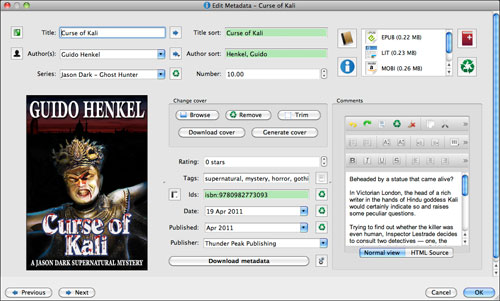Meta-data… what are they good for?
As people tackle the subject of e-book formatting, every once in a while I receive an email with the question, what meta-data in an e-book are actually used for. Since you will have to re-upload your book description, the ISBN and the keyword tags on every distribution channel’s portal again and again, the question clearly becomes, why am I entering it in Calibre in the first place, if it isn’t being put to use?
First, let me say that it is possible to create e-books without most of the meta-data. Things such as the product description, keywords, ISBN identifier, publisher and so forth are not mandatory, so if you feel lazy, you can leave them out.
However… you knew there would be some kind of catch didn’t you? So, however, if you think they are not being used, you are mistaken. Meta-data are being put to use in a number of places, but the most important one for you as a reader is probably the device itself.

When you load your book onto your Kindle or Nook, you see a listing of titles in your library. Depending on your settings and your device, you will also see a small thumbnail of the book’s cover. Do you have any inkling, where that comes from? The meta-data you provided, naturally.
But that’s not all. Many devices allow you to sort books by author, again, using the e-books’ meta-data to dictate the sorting. If the library software on your device is a bit more sophisticated it will allow you to categorize books by genres and keywords, using the “keyword” meta-data you have provided in your e-book.
And so it goes, on and on. While I can’t think of any platform that currently makes use of it, it is also easily possible to think of software that allows you to take a quick preview of the book by printing the product description — culled from the book’s meta-data, of course.
It may feel like you are duplicating information over and over again as you prepare your e-books and upload them to distribution portals, and in fact, you are. I, for example, would love for Amazon to retrieve the necessary data from my e-book file by default, for example, saving me the time it takes to enter all that duplicate stuff, but ultimately it is of no relevance. The process is easy and fast enough as it is, so I have no real complaints here.
What is important, though, is to understand that a book’s meta-data are being put to use over and over again, silently, in the background, to make sure your readers will get the most out of the book and their e-book readers. In fact, I would not be surprised to see meta-data expanded upon in the future to include proper library categorization, author biography and cross references to other books by the same author or titles in a series. These additions may just be around the corner, as Apple is already requesting that sort of information when you upload your book to the iBookstore. Hilariously, though, it makes absolutely no use of the information at this time, it seems, as the iBookstore search engine is about as dumb as a piece of bread. But hey, you can’t have everything…
So, is it a good idea to skimp on your meta-data? Probably not, even though it may seem like redundant information.
